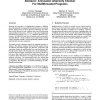Free Online Productivity Tools
i2Speak
i2Symbol
i2OCR
iTex2Img
iWeb2Print
iWeb2Shot
i2Type
iPdf2Split
iPdf2Merge
i2Bopomofo
i2Arabic
i2Style
i2Image
i2PDF
iLatex2Rtf
Sci2ools
242
click to vote
POPL
2004
ACM
2004
ACM
Atomizer: a dynamic atomicity checker for multithreaded programs
Ensuring the correctness of multithreaded programs is difficult, due to the potential for unexpected interactions between concurrent threads. Much previous work has focused on detecting race conditions, but the absence of race conditions does not by itself prevent undesired thread interactions. We focus on the more fundamental non-interference property of atomicity; a method is atomic if its execution is not affected by and does not interfere with concurrentlyexecuting threads. Atomic methods can be understood according to their sequential semantics, which significantly simplifies (formal and informal) correctness arguments. This paper presents a dynamic analysis for detecting atomicity violations. This analysis combines ideas from both Lipton's theory of reduction and earlier dynamic race detectors. Experience with a prototype checker for multithreaded Java code demonstrates that this approach is effective for detecting errors due to unintended interactions between threads. In p...
Fewer False Alarms | Fundamental Non-interference Property | POPL 2004 | Prevent Undesired Thread | Programming Languages |
Related Content
| Added | 03 Dec 2009 |
| Updated | 03 Dec 2009 |
| Type | Conference |
| Year | 2004 |
| Where | POPL |
| Authors | Cormac Flanagan, Stephen N. Freund |
Comments (0)

